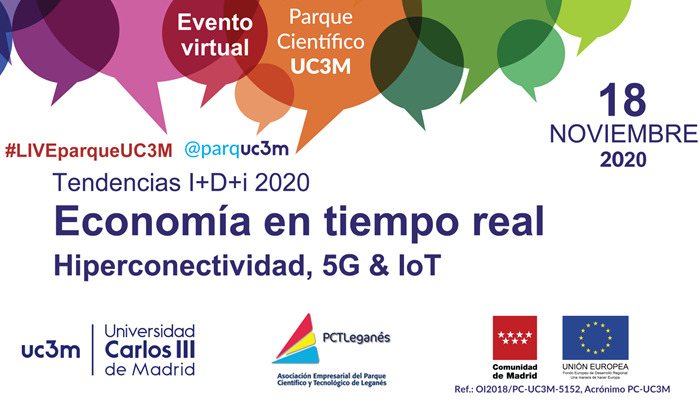IMDEA Networks

“Economía en tiempo real: Hiperconectividad, 5G & IoT”
Arturo Azcorra reflexionó sobre el 5G en el encuentro online organizado por la UC3M
20 Noviembre 2020

La Universidad Carlos III organizó, el 18 de noviembre, el encuentro “Economía en tiempo real: Hiperconectividad, 5G & IoT”, moderado por Alberto Iglesias, periodista y subdirector de Innovadores by Inndux y presentado y clausurado por Carlos Blanco, vicegerente de Investigación y Transferencia de la UC3M. El evento fue cofinanciado por la Comunidad de Madrid y Fondos Feder (UE).
Arturo Azcorra, director de IMDEA Networks Institute, catedrático de Ingeniería Telemática de la Universidad Carlos III de Madrid y vicepresidente de 5TONIC participó en la primera de las dos partes: “Conocimiento e Investigación UC3M”. Junto a él, también participaron Jesús Carretero, experto en IoT y sus aplicaciones – investigador responsable del grupo de Arquitectura de Computadores, Comunicaciones y Sistemas (ARCOS) UC3M- y Rosa Elvira Lillo, experta en Big Data y sus aplicaciones – investigadora del departamento de Estadística UC3M y directora de IBiDat-.
El motivo de este encuentro fue el de reflexionar sobre la influencia de la llegada del 5G en la economía, en las comunicaciones, el transporte y en nuestra forma de trabajar y de relacionarnos con el resto de la sociedad. En este contexto, Azcorra destacó cómo “la hiperconectividad nos va a afectar en aspectos como la salud -estaremos monitorizados-, los vehículos autónomos y los drones, los videojuegos -las consolas tenderán a desaparecer, ya que estarán en el borde la red-, etc.”.
El director de IMDEA Networks, aparte de despejar la confusión sobre la relación entre 5G y las operaciones en remoto –“no tienen nada que ver”- subrayó el desafío al que se enfrenta la sociedad con la implantación de esta tecnología: “El reto más importante es capitalizar el 5G… Como defensor de esta tecnología, advierto que se destruirá trabajo que se puede automatizar, como pasó con la automatización del campo (se perdieron puestos en el campo pero se crearon en la industria). Ante esta tecnología que vendrá, que no se puede parar, habrá que crear nuevos puestos. Será el desafío de la nueva economía, de cada país”.
Azcorra también señaló cómo las empresas serán las principales beneficiarias de esta implantación y cómo las personas se beneficiarán de estos avances en empresa e industria, gracias a una tecnología “cuya principal innovación, y aporta muchas, es la posibilidad de computación en el interior de la red: los terminales no solo ‘hablan’ con otro terminal, sino que ahora ‘hablan’ con la red”. Nuevas capacidades y nuevos negocios que requieren un esfuerzo de planificación por parte de la sociedad.


Comentarios recientes